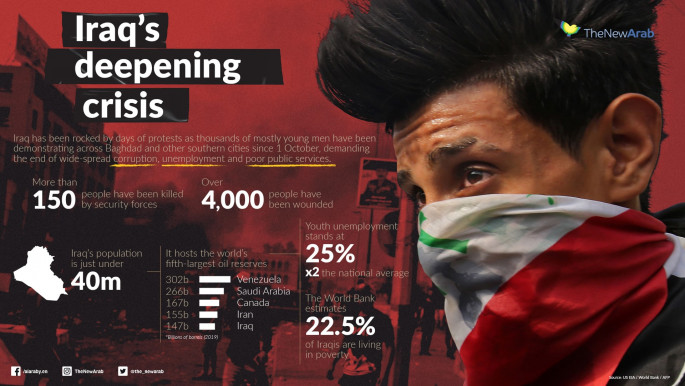Baghdad on lockdown as fresh Iraq protests threaten Green Zone
Iraqi security forces closed three bridges and the Green Zone in Baghdad, as an estimated 300 people defied the security presence to gather in the capital’s Tahrir Square.
The rallies issued calls for the country's entrenched political class to be "uprooted", calling them “all thieves”.
Anti-Iran sentiment also characterised Thursday’s rallies, with demonstrators chanting: "Baghdad is free, Iran get out!", as well as “Qassim Soleimani get out of our country,” referencing the chief of Iran’s Revolutionary Guards who hold sway over powerful Shia militias in Iraq.
Protesters and government officials alike have accused Iran and other foreign powers of interfering in the movement.
Demonstrators also demanded the leader of the Shia PMF militia, Faleh al-Fayyadh, disclose the names of snipers thought to be responsible for killing dozens of demonstrators during protests earlier this month.
Twitter Post
|
Authorities fear Friday’s demonstrations will overrun the high-security Green Zone, which contains Iraqi government buildings and foreign embassies - as they have done 2016 and 2018.
Several key bridges across the Tigris River connect downtown Baghdad and Tahrir Square with Karkh, the district where the Green Zone is located.
In the southern city of Nasiriyah, demonstrators said they would remain in the streets "until the regime falls".
The Iraqi government is expected to announce a new reform package on Friday - the fourth in less than a month - in a bid to quell the popular unrest over the economic situation, namely corruption, unemployment and declining public services.
Influential cleric Moqtada al-Sadr gave his supporters the green light to resume protests on Friday, which marks the anniversary of Prime Minister Adel Abdel Mahdi's government taking office.
October 25 also marks the deadline issued by the spiritual leader of Iraq’s Shia majority Grand Ayatollah Ali Sistani, for the government to respond to protester demands.
Twitter Post
|
Demonstrations erupted in the first week of October with calls for an end to widespread corruption and unemployment, then evolved into demands for a political overhaul.
But they were met with a tough response, with 157 people killed in six days, according to a government toll.
Ahead of the planned protests, the country was on a knife's edge on Thursday, with many stockpiling food, petrol and other supplies.
The United Nations had urged the government to "draw lessons learned" from the earlier bloodshed.
But Thursday's demonstrations began ahead of schedule and appeared to be peaceful, with no reported incidents of violence.
Interior Minister Yassin al-Yasseri was in Tahrir Square to reassure protesters that security forces would "protect" them, his office said in a statement.
 |
|
| Click to enlarge |
Agencies contributed to this report.
Follow us on Twitter: @The_NewArab




 Follow the Middle East's top stories in English at The New Arab on Google News
Follow the Middle East's top stories in English at The New Arab on Google News

![22 Arab countries at COP29 have rejected the targeting of fossil fuels [Getty]](/sites/default/files/styles/image_330x185/public/2024-11/GettyImages-2184289638.jpg?h=199d8c1f&itok=ptHl5bec)
![Dozens of people turned out for the funerals [Getty]](/sites/default/files/styles/image_330x185/public/2024-11/GettyImages-2185229760.jpg?h=e7c891e8&itok=1bctDcE6)